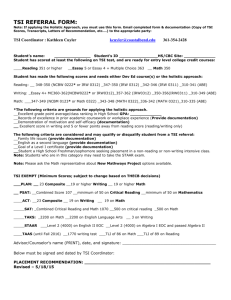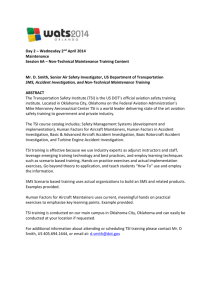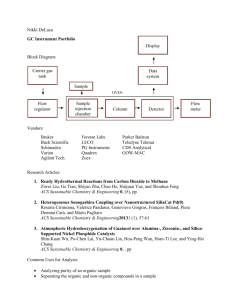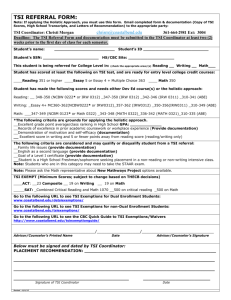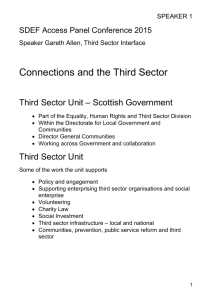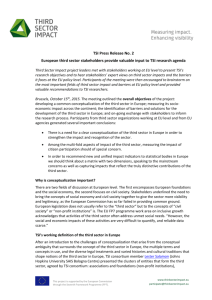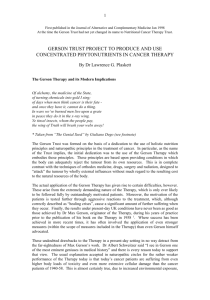Handout - Texas Association of Secondary School Principals
advertisement
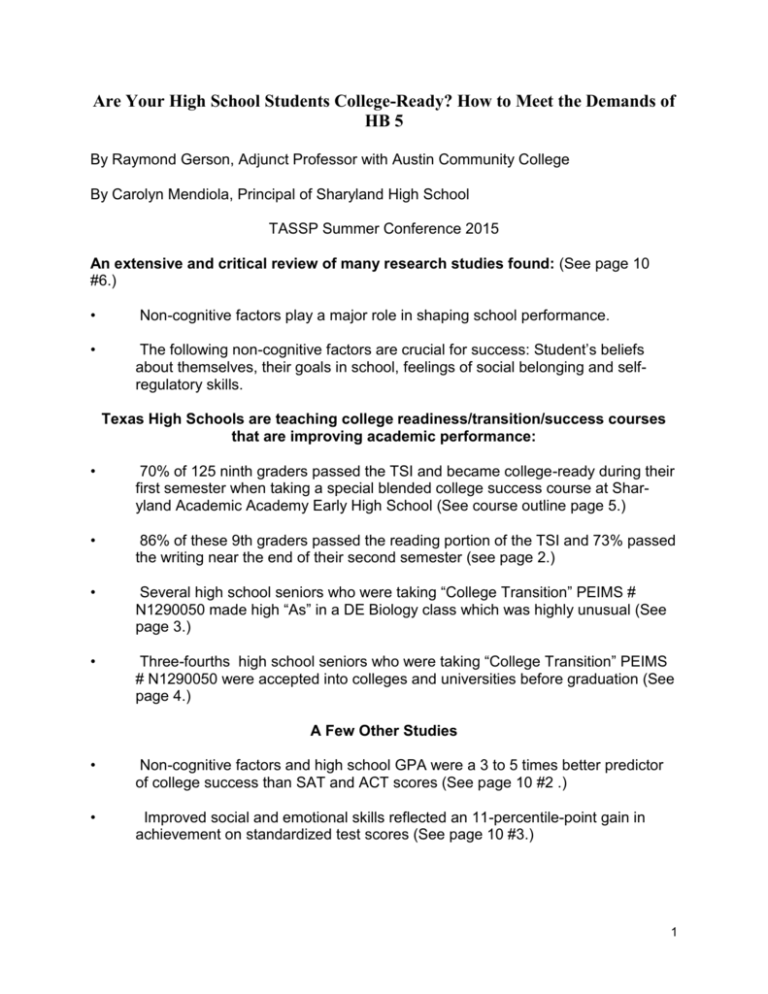
Are Your High School Students College-Ready? How to Meet the Demands of HB 5 By Raymond Gerson, Adjunct Professor with Austin Community College By Carolyn Mendiola, Principal of Sharyland High School TASSP Summer Conference 2015 An extensive and critical review of many research studies found: (See page 10 #6.) • Non-cognitive factors play a major role in shaping school performance. • The following non-cognitive factors are crucial for success: Student’s beliefs about themselves, their goals in school, feelings of social belonging and selfregulatory skills. Texas High Schools are teaching college readiness/transition/success courses that are improving academic performance: • 70% of 125 ninth graders passed the TSI and became college-ready during their first semester when taking a special blended college success course at Sharyland Academic Academy Early High School (See course outline page 5.) • 86% of these 9th graders passed the reading portion of the TSI and 73% passed the writing near the end of their second semester (see page 2.) • Several high school seniors who were taking “College Transition” PEIMS # N1290050 made high “As” in a DE Biology class which was highly unusual (See page 3.) • Three-fourths high school seniors who were taking “College Transition” PEIMS # N1290050 were accepted into colleges and universities before graduation (See page 4.) A Few Other Studies • Non-cognitive factors and high school GPA were a 3 to 5 times better predictor of college success than SAT and ACT scores (See page 10 #2 .) • Improved social and emotional skills reflected an 11-percentile-point gain in achievement on standardized test scores (See page 10 #3.) 1 • Cognitive ability in GED holders and high school graduates was the same in a large study. Non-cognitive skills was the predictor of much more successful college, career and life outcomes for the high school graduates (See page 10 #7.) Dear Mr. Gerson, Thank you for preparing well organized and easy to follow textbooks. The teachers who used the curriculum first semester for Achieve College Success said they enjoyed the information that could be applied to their classes. It also helped the students realize the severity of time management, study skills, and organization. This was later emphasized in the second semester with your Achieve Career Success. The students were shown how these skills they develop now will also apply to the real world. Both books were used to teach two semesters of College Transition PEIMS # N1290050. First semester the students completed a college research project in which they presented about the college they would like to attend, what it has to offer for their choice of major, and what they need to complete for the career that they want (ie, Masters, Doctorate, etc.). Second semester the students completed the summaries and activities in the book. This is being included in their final end of the year portfolio. I personally enjoyed seeing the students responses to the activities and especially the summaries. Near the end of the second semester 108 of the 125 9th grade students have passed the reading part of the TSI and 92 passed the writing. Mrs. Pamela Reyes Buentello 2 English I Pre-AP Instructor Sharyland Advanced Academic Academy May 8, 2015 Note: Pamela Reyes developed the curriculum for these courses. From: Nancy Ochoa-Garza To: Ofelia A. Perez Subject: Biology DE Ms. Perez, I don't know who you are but I need to tell you that you are doing a phenomenal job in your college transitions class. I have several students in my Biology DE class who are also taking college transitions. I gave a test out Wednesday and the results were awesome. In the seven years I have taught Biology DE I have never had a large number of A's on any test much less test scores of 97 and 98. I have many times told students that they need to read before they come to class. They need to go over their notes on a daily basis, and they need to ask questions in class. I tell them they should invest time everyday in reviewing material taught in the class that day. I was very surprised with my class this time around. I even asked if they had gotten access to a test of mine. They were all surprised I asked. After I went over the test, I asked people who got an A to share with the class what they did to prepare for the test. Many of them credited the college transition class and what they have learned. I told them to make sure they go back to your class today and thank you for their success. I hope they do so that you can also experience the excitement I had yesterday and in watching their faces glow. Once again, congratulations on doing a fantastic job. I sure hope 3 more students would take a college transitions class before taking Dual Enrollment classes. Nancy Ochoa-Garza Sharyland High School To: Raymond Gerson, Author of Achieve College Success and Achieve Career Success Hello! I was going to send you a message yesterday, but I am so busy with finals, that I was not able to complete my memo to you. I hope you are well. I absolutely LOVE my College Transition Class!! I have learned so much from this class, and my students are totally different students now from when they began. I cannot imagine a Senior not taking this class!! All of my students researched at least 10 different colleges, along with degree plans, costs and entrance requirements and have applied to at least 2 colleges and more than 3/4 of my students have been accepted to colleges and Universities! I am enclosing some letters that they have written. I do not currently have it in my schedule, but I am going to meet with our principal to discuss including this class for next semester. Aside from the book, I include all sorts of tips, not only for college, but for life use,videos and have invited various speakers from Border Patrol Agents to Judges. They all come in and speak to them about their college experiences and advice they have for them about their futures. Many of these speakers have made a major impact on my students future perspectives in school and in life. 4 I am glad to be a part of the lives of every young adult in my class, and I hope that with my own personal experiences and advice that I have also given them, that the transition to college will be easier, and that they will be successful. I hope to continue to teach this class, because it has been the most rewarding and enjoyable class I have ever taught. Thank you for all your help! Yvette Vela, Sharyland High School Suggested Blended 16 Week Course with Achieve College Success book by Raymond Gerson Week 1. Introduction/ ACC Orientation/Mindset/Goals (ACS) Chapter 1 2. TSI Pre-Test/Reading Comprehension Strategies (ACS) Chapter 4 3. Reading TSI Prep 4. Writing and Note Taking Skills (ACS) Chapter 5 5. Writing TSI Prep 6. Writing TSI Prep Review of Reading, Writing Instruction for TSI Prep Review ACC resources – First TSI Testing by Oct. 3 7. Career Development (ACS) Chapter 7, field trips to College campus 8. Career Development (ACS) Continued, field trips to ACC (TSI Reading/Writing Prep and testing for those who need it) 9. Learning styles and Types of Intelligence (ACS) Chapter 2 (TSI Reading/Writing Prep and testing for those who need it) 10. Learning styles and Types of Intelligence (ACS), Chapter 2, continued (continued TSI Reading/Writing Prep and testing for those who need it) 5 11. Time Management (ACS) Chapter 3 (continued TSI Reading/Writing Prep and testing for those who need it) 12. Memory and Test Taking Strategies (ACS) Chapter 6 13. Memory and Test Taking Strategies (ACS) Chapter 6 (continued TSI Reading/Writing Prep and testing for those who need it) 14. Critical Thinking (ACS) Bonus Chapter (continued TSI Reading/Writing Prep and testing for those who need it) 15. How to Create the Life You Want (ACS) Chapter 8 (continued TSI Reading/Writing Prep and testing for those who need it) 16. Final Projects – Life/Goal Mapping/Self-Evaluation (Final TSI Testing of Semester) The Impact of Small Goals on Student Success By Raymond Gerson Can a simple and small goal setting activity be life-changing for students? It has worked wonders for many of my students. I am an adjunct professor with Austin Community College and I teach college success/transition courses for at-risk students. Goal Activity One of the activities I use teaches students the power of setting and achieving small and very short goals. At first I have students discuss the similarities and differences between wishes and goals. They begin to understand that goals involve a specific plan with measurable goals and deadlines. Then we take a look at and discuss the concept of Kaizen which is the Japanese term for small steps for continuous improvement. Brainstorming Small Goals Students are asked to brainstorm several goals they would be interested in achieving that must be completed within the next 1-5 days. Then I give each student a 3 by 5 card. They are asked to choose one of the small goals that they brainstormed and to write it on one side of the card. They are asked to choose a goal that is challenging, but achievable. With many of my students it is usually necessary to share and have them discuss several examples. My students choose a variety of goals such as: Overcoming a habit of procrastination by turning in a paper on time, making a minimum and stated grade on an upcoming test, cleaning a cluttered room at home, saving a certain amount of money, making an improvement related to sports, etc. 6 Three Steps to Achievement After writing their goal on one side, they are asked to list three steps on the other side of their card which will be needed to accomplish their goal. They are also asked to write a self-reflection essay after doing their goal activity. In their paper they are asked to state the goal, steps taken, obstacles overcome, outcome and lessons learned. I require a minimum of a half page typed paper for all of my college students. I also create a template for students that they can fill-in and use to help them write their essay. Example Essay from a Student (with student permission) My Goal Paper By Sugey Zavala My short and small goal that I achieved was to at least pass my biology test on Friday. To achieve this goal, for the first time I worked really hard and I did everything I could to pass my test. All of my hard work at the end paid off because I got an outstanding grade on my biology test. The steps that I took to achieve my goal were a little difficult because I couldn’t do other things that I like to do. One step was staying after school almost every day of the week so I could understand everything clearly. Also in my free time, I would study everything we learned that day in class to make sure I understood it. That week I paid extra attention to the teacher, because I didn’t wanted to miss anything we were learning each day. While doing these steps to achieve my goal, I had to overcome some obstacles too. One obstacle was not play my favorite sport, soccer, like always because I stayed after school for about two hours almost every day. Another obstacle was that in my free time I couldn’t go out with my mom to the stores because I stayed home studying really hard to achieve my goal. 7 Finally, it was Friday and I was doing my biology test that I worked so hard to at least pass. My surprise was the test was very easy and I was the first one to finish. When everybody was finished, the teacher gave us back our tests already graded and I was very happy because I had gotten my first hundred in biology and I was the only one that got a hundred in my class. At that moment I was so happy because I had not only achieved my goal but I went passed it with the best grade in my class. From working on this short and small goal I learned that when you work on something really hard, you can achieve or overcome anything you want. In order to achieve my goal I had to overcome some obstacles, but at the end everything was worth it. Lessons Learned Sugey told me that this small goal activity completely changed her perception of the student she was capable of becoming. She worked hard just to pass the test and was shocked to make a hundred. She realized the power of setting short goals and gained the insight that little goals can become like steppingstones to the achievement of her larger and long range goals. Even when my student’s goals have to do with skateboarding or some non-academic goal, they usually understand how to apply this goal setting process to school and to their life. As I am writing this, I am reminded that Robert Sternberg defined “Successful Intelligence” as the ability to achieve our goals. I also write a lot of comments on my students self-reflection papers and use them as a teaching tool to reinforce their lessons. Strategies Plus A Positive Mindset Bring Success In my experience, both effective strategies and a success mindset are important for success to occur. What I like about this simple goal activity is that it gives students strategies for setting goals, helps them realize that much can be accomplished with small steps and changes their mindset about what they can accomplish. Teaching students how to set small goals is a process that can be used not only by professors of college success courses. Professors who teach other courses and counselors can also use this simple process with their students. Raymond Gerson, Adjunct Professor, Human Development For further information contact the author at Austin Community College (ACC) - 1020 Grove Blvd. Austin, Texas 78741. Email: r.gerson@austincc.edu 8 How Many Dreams? A poem by Raymond Gerson (can be sung to Blownin’ in the Wind by Bob Dylan) How many dreams can I turn into goals, To make my dreams come true? And how many plans will need to be made, To keep my goals in view? And how many steps will I need to take, To make my life like new? The answer my friend, is found deep within, The answer is found deep within. How many times will I set measurable goals, To make my wishes be real? And how many deadlines am I willing to set, To pursue my goals with zeal? 9 And how specific am I willing to get, To achieve a big deal? The answer my friend, is found deep within, The answer is found deep within. How many years am I willing to fight, To create the life that I need? And how many wishes in my heart will I want, Before I’m willing to proceed? And how long am I willing to go, Before I finally succeed? The answer my friend, is found deep within, The answer is found deep within. Copyright 2013. Raymond Gerson Research Studies on Mindset and Other Non-Cognitive Factors 1. Blackwell, L.S., Trzesniewski, K.H.,and Dweck, C.S. (2007). Implicit Theories of Intelligence predict achievement across an adolescent transition: A longitudinal study and an intervention. Child Development, 78. 246-263, Study 1.) 2. Bowen, William, Chingos, Matthew and McPherson, Michael. Crossing the Finish Line: Completing College at America’s Public Universites. Princeton University Press. 2011. 3. Durlak, J.A., Weissberg, R.P., Dymnicki, A.B., Taylor, R.D.and Schellinger, K.B.(2011), The Impact of Enhancing Student’s Social and Emotional Learning: A Meta-Analysis of SchoolBased Universal Interventions. Child Development, 82: 405-432. doi: 10.1111/j. 14678624.2010.01564.x 4. Duckworth, Angela, Peterson, Christopher. Grit: Perseverance and Passion for Long-term Goals. Journal of Personality and Social Psychology, 2007. Vol.92. No. 6. 1087-1101. 5. Dweck, Carol. Self-Theories: The Role of Motivation, Personality and Development. Psychology Press. 2000. 6. Farrington, Camile A., Roderick, Melissa, Allensworth, Elaine, Nagaoka, Jenny, Keyes, Tasha Seneca, Johnson, David W. and Beechum, Nicole. Teaching Adolescents to Become Learners: 10 The Role of Non-Cognitive Factors in Shaping School Performance: A Critical Literature Review: 2012. 7. Heckman, James, Humphries, John, and Mader, Nicholas (June 2010), The GED. NBER Working Paper Series. National Bureau of Economic Research. Cambridge, MA. 8. Paunesku, David, Gregory Walton, Carissa Romero, Eric Smith, David Yeager and Carol S. Dweck. Mind-Set Interventions are a Scalable Treatment for Academic Underachievement. Psychological Science Online. dol: 10.11711095615571017. April 10, 2015. 9. Robins, R.W. and Pals.J.L. (2002). Implicit self-theories in the academic domain: Implications for goal orientation, attributions, affect, and self-esteem change. Self-and Identity, 1, 313-336. Books Related to Mindset, Learning Strategies and Non-Cognitive Skills 1. Dweck, Carol. Mindset:The New Psychology of Success. Ballantine Books, 2007. 2. Gerson, Raymond. Achieve College Success: Learn How in 20 Hours or Less. (4th edition) Upbeat Press, 2012. 3. Gerson, Raymond. Achieve Career Success: Discover and Get the Job You Want.(2nd edition) Upbeat Press, 2012. 4. Pink, Daniel. Drive: The Surprising Truth About What Motivates Us. U.S. Riverhead Books, 2011. 5. Ritchart, Ron, Mark Church and Karin Morrison. Making Thinking Visible: How to Promote Engagement, Understanding and Independence for All Learners. Jossey bass, 2011. 6. Zhao, Yong. World Class Leaders: Educating Entrepreneurial and Creative Students. Thousand Oaks, Ca. Corvin Sage Company. 2012. Contact Information Raymond Gerson Email: raymondgerson@gmail.com Website: http://www.collegereadinesstraining.com 11 Phone: (512) 608-3156 Publisher: Upbeat Press President: Lorna Adams Email: lorna2013@upbeatpress.com Website: http://www.upbeatpress.com Phone: (210) 415-3552 12
